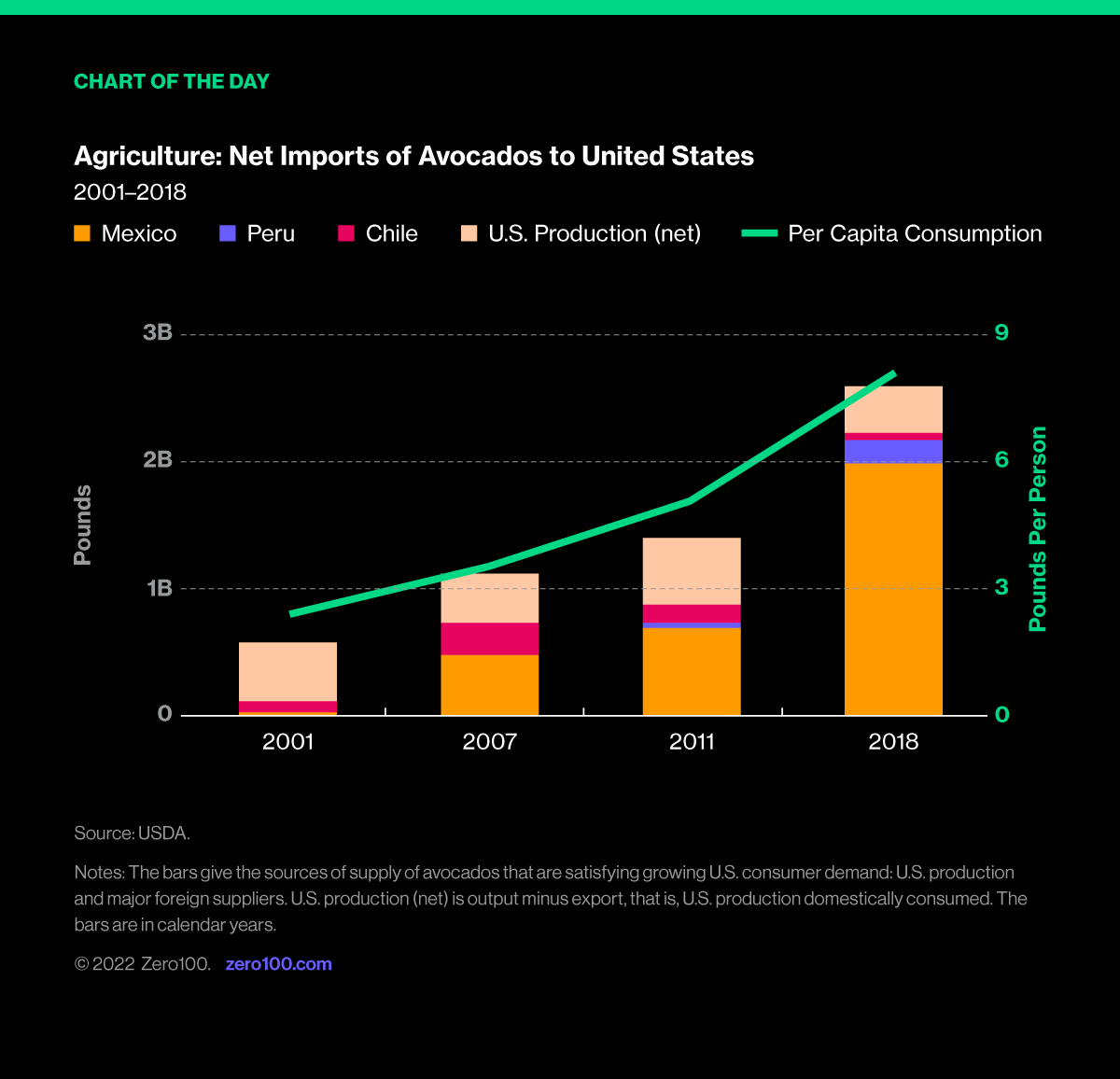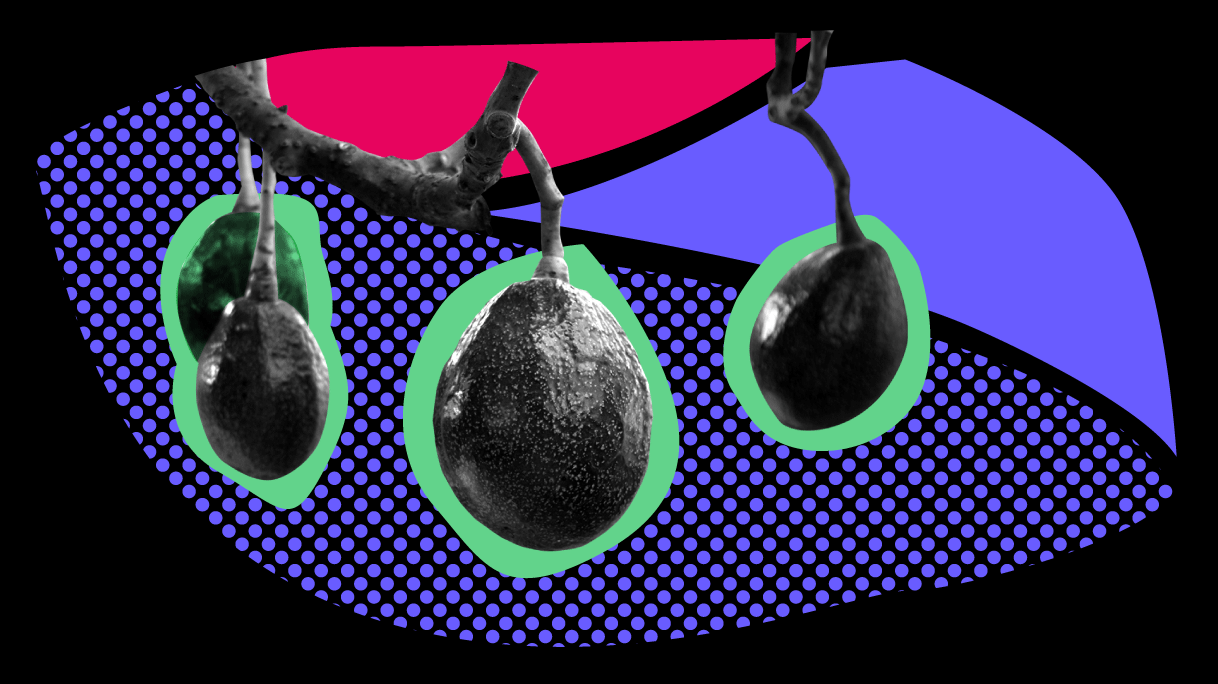AvocaDOs & AvocaDON'Ts
This past Tuesday, we enjoyed 2-22-22 (or even, 22-2-22 depending on your date formats), making it a Twos-day. This inspired numerous promotions—and in America, the confluence of National Margarita Day meant $2 frozen drinks for savvy deal-seekers. Unfortunately for many, the accompanying guacamole (the avocado's “best self”) cannot be as advantageously priced. More like $22. Not the thrifty Twos-day we had in mind.
While those in Europe are facing high gas prices and power bills, the avocado made news this week as prices go up in America and it becomes the latest victim to “supply chain is the worst”-it is that continues to sweep the industry.
As such, we're inspired by the humble and lovely avocado this week and it's through this lens that we explore three themes from the week's news.
It's Always About the Inventory
The last 10 days have been a rollercoaster for avocado fans. Imports from Mexico, who produces the majority of the avocados eaten in America, were banned because of the treatment of a US avocado inspector, and estimates were that only a week of avocado inventory existed in US supermarket shelves. About a week later, the ban lifted.
This highlights the channel and the pipeline of inventory, the misunderstood power player in our supply chains. Inventory made headlines in the textile industry this week as forward-buying shifts risk in the supply chain and automotive seeks lithium battery inventory.
Avoca-don't: wait for your next Collaborative Planning, Forecasting, and Replenishment (CPFR) review to get a handle on forward-facing inventory needs from your channel partners.
Avoca-do: get creative with channel inventory, taking note of pilot programs tested out these last months.
Misleading Customers Won't Fly
If you've ever been delighted by low-cost guac, chances are: you ate a fake. Yes, it's true, the food supply chain counterfeits do not spare the avocado. Counterfeits show up this week in a more serious manner in the masks used against COVID-19. Counterfeits extend across industries: fashion, electronics, pharma and others.
Left unchecked by the supply chain, counterfeits tend to fall into the greenwashing category. While greenwashing intentionally masks the truth, counterfeits mask a story not found. A lot happens in our supply chains that we don't know about today. And while we are rapidly gaining more visibility, the resistance of data sharing from n-tier suppliers is sticky.
Avoca-don't: lie to your customers. It's not working out.
Avoca-do: explore sharing visibility into your supply chain with customers. Be honest. Radical Transparency, as we call it at Zero100, will buy you more goodwill with your customers than the guise of perfection.
Capacity Constraints Reimagined
The U.S. grows avocados in Florida and in California, and between both locations can support about 10% of what Americans eat. The rest, we import. And with imports come the risks of distance and borders. We, of course, see the same pattern in most all goods we have in this country. One example is highlighted this week as the Biden administration announces a focus on the mineral supply chain, focusing on those minerals prevalent to the energy transition. Additionally, Russia's disruption of Ukraine, worsened by the military invasion, highlights the ongoing role of oil in our economies even as we commit to changing our ways.
We feel this in our supply chains as many of us are in the midst of exploring manufacturing capacity in new-to-us countries including reshoring. We continue to feature in financial reports and are pushing on the industrial giants like GE, as reporters warn that the supply chain problem won't go away anytime soon. (I have to ask myself, though... have our supply chains ever been devoid of problems? I thought that's why we all chose this profession...)
Avoca-don't: sit idle these days as others around us are busy looking for alternatives to today's capacity.
Avoca-do: reimagine what capacity could mean in your supply chain. For the avocado, Walmart's recent investment in vertical farming technology could mean short, hyper-local supply chains that can produce a region's needs. It's not as far-fetched as it once seemed, as BioNTech announced this week a mobile factory to reimagine capacity for vaccine production.
As we head into the weekend, we remember that as we rally together towards the serious work of achieving zero carbon, we can pause and relish in the joys of the supply chain profession.

Critical Reading
THE WALL STREET JOURNAL
GM, Volkswagen Build Up Their Battery Supply Chains Amid Electric-Vehicle Push
Commentary: Transitioning back to vertical integration, auto makers hope to combat rising prices, manage quality, and avoid further fallout from the semiconductor shortage – ultimately, they strive to establish control over more of the electric vehicle supply chain.
#EV #autoindustry
BLOOMBERG
Unethical Firms Risk Massive Bills in EU Supply-Chain Crackdown
Commentary: In a watershed moment, the EU has drafted a law requiring firms to take account for their labor and environmental practices. Companies risk massive fines if they are found to be violating the ethics standards outlined in the new law.
#EU #ESG #ethics
Commentary: Seeing an opportunity to capture the tens of millions of tons of CO2 released into the atmosphere every year from ethanol refineries in Iowa, Navigator CO2 Ventures proposed a pipeline, which they called, “an investment into the state's agricultural future.” Locals are far from convinced.
#co2 #agriculture
